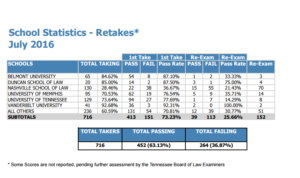By Daniel Horwitz:
Demonstrating his laudable commitment to participating in the political process and encouraging others to do so as well, international music sensation and Memphis-bred popstar Justin Timberlake recently posted an instragram photo of himself rocking the (early) vote at his polling place in Memphis, Tennessee. That terrible offense, unfortunately, has earned him a rebuke from the Shelby County District Attorney’s office, which is currently conducting a criminal investigation into his scandalous conduct. The reason? Tennessee’s poorly-worded “Use of Mobile Electronic and Communication Devices at Polling Place for Informational Purposes” statute, codified at Tenn. Code Ann. § 2-7-142(b), which provides that:
“Any voter using a mobile electronic or communication device . . . shall be prohibited from using the device for telephone conversations, recording, or taking photographs or videos while inside the polling place.”
Violating this provision is theoretically a Class C misdemeanor punishable by up to 30 days in jail and a $50.00 fine. The law, however, is unconstitutional.
The practice of taking “ballot selfies” – photographs of one’s ballot that may or may not also include the voter – has become increasingly popular among voters in recent years. Celebrities from Beyoncé to Sean Hannity to Kim Kardashian have also gotten in on the action. Unfortunately, however, the celebratory practice of posting ballot selfies – which should be welcomed and perhaps even encouraged in a political climate in which many voters, especially young voters, never vote at all – has also drawn the attention of overzealous state regulators. During the November 2014 election, for instance, “approximately 35 states prohibited ballot selfies in one form or another,” and several states – Tennessee among them – “have since followed suit.”
At least one prominent election law scholar has supported the bans both as a policy matter and as a constitutional one, characterizing them as “a threat to democracy” because they could ostensibly facilitate vote-buying or coercion schemes. As this author explained in his 2015 SMU Science and Technology Law Review article A Picture’s Worth a Thousand Words: Why Ballot Selfies Are Protected by the First Amendment, however, that conclusion is woefully misguided, and ballot selfies are safely protected by the First Amendment. Importantly, every single court that has evaluated the issue to date – which includes the U.S. District Court for the District of New Hampshire, the U.S. Court of Appeals for the First Circuit (upon review of the District Court of New Hampshire), the U.S. District Court for the Southern District of Indiana, and the U.S. District Court for the Southern District of Michigan – has also agreed that states cannot lawfully prohibit ballot selfies without running afoul of the First Amendment, unanimously striking down various states’ ballot selfie prohibitions on free speech grounds. Thus, as far as the federal judiciary is concerned, Tennessee’s ballot selfie prohibition cannot withstand constitutional scrutiny.
Three main reasons, detailed extensively in this article, support the conclusion that ballot selfies may not lawfully be prohibited without violating the First Amendment.
First, ballot selfie bans unnecessarily restrict a substantial amount of constitutionally protected speech (like Mr. Timberlake’s) that is completely unrelated to vote buying, while simultaneously doing nothing to prevent far simpler forms of vote buying, such as absentee ballot fraud (which can be accomplished outside of the comparatively well-surveilled atmosphere of a polling place).
Second, the “compelling” nature of the Government’s interest in enacting broad-based laws to guard against vote buying is subject to considerable doubt, because vote buying is statistically non-existent even in jurisdictions where it is easy to accomplish.
Third, and most importantly, because voters have the ability to change their vote even after taking a ballot selfie, ballot selfies are a useless tool for promoting vote buying anyway—rendering the entire premise behind such laws baseless. That reality is exposed, for example, by this set of pictures (click on the photo to enhance it) that the author took during the 2015 Nashville mayoral election, which collectively illustrate just how easy it is to change one’s vote after making an initial selection:
In other words, because ballot selfies do not provide a prospective vote-buyer any level of certainty that a ballot has actually been cast in a particular way (an absolute prerequisite to any effective vote-buying scheme), ballot selfies are a useless tool for committing fraud, and banning them serves to do nothing but interfere with the political speech of innocent voters who want to do nothing more than celebrate the fact that they voted.
In sum: Justin Timberlake should be applauded for his activism and his decision to celebrate the right to vote, which is fully protected by the First Amendment. As such, today – like most days – JT’s an American hero.
Update, 5:07 PM: To the surprise of nobody, Justin Timberlake’s prosecution for violating Tennessee’s ballot selfie ban won’t go forward.
Like ScotBlog? Join our email list or contact us here, or follow along on Twitter @Scot_Blog and facebook at https://www.facebook.com/scotblog.org

